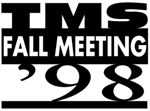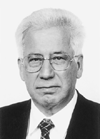

 |
|---|
TMS will once again present its extremely popular Tutorial Luncheon Lectures Series at the TMS Fall Meeting '98 on Monday, October 12, 1998. This series offers an informal seminar atmosphere for expert presentations on subjects designed either as theoretical review or as informal discussion of experimental techniques and leading edge scientific advancements. The lecture format includes optional "brown bag" lunch for $15. Lunch begins at 12:00 noon, followed by a 40 minute tutorial lecture beginning at 12:20 p.m. Tickets may be purchased in advance when you register to attend the TMS Fall Meeting '98 or on-site at the TMS Registration Desk at the O'Hare Hilton. There will be no charge for those attending the lecture who do not wish to purchase the lunch.
The adoption of Engineering Criteria 2000 (EC2000) by the Accreditation Board for Engineering and Technology (ABET) represents a radical change in the accreditation process for engineering educational programs. The emphasis will shift from an auditing of input by the institution to an outcomes-based assessment of the product (students demonstrated abilities). The focus will be on continuous improvement in the educational experience of students. The lecture will present an overview of the motivation for change, the content of EC2000, the processes to be used in accreditation visits, and the schedule for implementation.
About the Presenter: Carl J. McHargue is Professor, Materials Science and Engineering and Director, Center for Materials Processing at the University of Tennessee-Knoxville. He obtained the B.S. in Metallurgical Engineering, M.S. in Metallurgical Engineering, and Ph.D. from the University of Kentucky. After 38 years at the Oak Ridge National Laboratory, he joined the faculty of the University of Tennessee-Knoxville. The author of more than 200 scientific papers and holder of two U.S. patents, his recent research interests have been in the field of surface modification of materials. He is a Senior Member and Fellow of TMS and is active on the Accreditation and Education Committees. He is scheduled to assume the role of TMS representative to the ABET Board of Directors in November 1998.
"Advanced TEM Techniques for the Characterization of Materials"
Sponsored by: the TMS Young Leaders Committee
Presented by: Professor Manfred Ruhle, Max-Planck-Institut fur Metallforschung, Stuttgart, Germany
When: Monday, October 12, 1998, 12:00 noon-1:30 p.m.
Location: O'Hare Hilton Hotel, London Room
 |
|---|
The chemical composition can be studied by analytical microscopy which includes energy dispersive spectroscopy (EDS) as well as electron energy loss spectroscopy (EELS). Both techniques allow the qualitative and quantitative determination of the composition of materials. The spatial resolution depends on the diameter of the probe as well as the specimen thicknesses. An emerging technique is being reflected in the energy loss near-edge structure (ELNES). Through a quantitative interpretation of ELNES structure and comparison with theoretical modelling information on bonding in the crystal can be obtained with high spatial resolution.
About the presenter: Manfred Ruhle is currently Executive Director of the Max-Planck-Institut fur Metallforschung, Stuttgart, Germany. He earned his Dipl.-Physics (1963) and Ph.D. (1967) from the University of Stuttgart. He has been affiliated with the Max-Planck-Institut fur Metallforschung since 1967.
He has received numerous professional honors and serves on the editorial boards or as co-editor of the following publications: Interface Science; Zeitschrift fur Metallkunde; Journal of Microscopy; Journal of Electron Microscopy; European Physical Journal; Philosophical Magazine; Ultramicroscopy; Bulletin of Materials Science, India; Microscopy, Microanalysis; Microstructure; and Journal of Electron Microscopy Techniques.
Dr. Ruhle's research interests have focused on microstructure-property relationship of advanced materials; microstructural characterization of high performance materials with emphasis on transmission electron microscopy, including high-resolution and analytical electron microscopy, structure of grain boundaries in ceramics, analysis of atomistic structure of interfaces, determination of chemical composition of materials with high spatial resolution, bonding and debonding mechanisms and interfaces; and displacive transformations in inorganic materials.
| Search | TMS Fall Meeting '98 | TMS Meetings Page | About TMS | TMS OnLine |
|---|